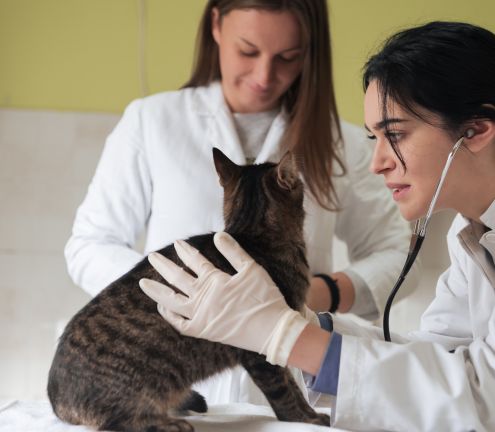Cats are curious and playful creatures, but sometimes, they may start sneezing frequently. A single sneeze is normal, just like in humans, but if your cat keeps sneezing, it could be a sign of irritation, allergies, or even an infection. So, why is my cat sneezing a lot?
Frequent sneezing in cats can be caused by dust, allergies, upper respiratory infections (URI), dental issues, or foreign objects stuck in their nose. While occasional sneezing is harmless, persistent sneezing—especially with other symptoms like a runny nose or coughing—may require a vet’s attention.
Let’s dive into the possible reasons behind your cat’s sneezing, when to be concerned, and how to help them feel better.
Common Causes of Cat Sneezing
If your cat is sneezing a lot, it could be due to various reasons, from mild irritants to underlying health issues. Occasional sneezing is normal, but if your cat is constantly sneezing or experiencing other symptoms like nasal discharge or coughing, it might be time to investigate further.
1. Upper Respiratory Infections (URIs)
One of the most common causes of frequent sneezing in cats is an upper respiratory infection (URI). Similar to a cold in humans, these infections are often caused by viruses, bacteria, or fungi. Feline herpesvirus (FHV-1) and feline calicivirus (FCV) are two of the most common viral infections that trigger sneezing, along with watery eyes, nasal congestion, and sometimes mouth ulcers.
Bacterial infections like Chlamydia felis and Bordetella bronchiseptica can also lead to sneezing, often accompanied by coughing and nasal discharge. If your cat is sneezing and coughing nose discharge, especially if it’s thick or yellow-green, it could be a sign of a secondary bacterial infection.
2. Allergies and Environmental Irritants
Cats can develop sensitivities to airborne allergens such as pollen, dust, mold, or smoke. Household products like scented candles, perfumes, cleaning sprays, and even certain types of cat litter can irritate their nasal passages, causing sneezing. If sneezing occurs after exposure to these substances, allergies or irritants may be the culprit.
Unlike in humans, cat allergies don’t always present with sneezing alone; some cats may develop itchy skin, watery eyes, or respiratory discomfort. If your cat’s sneezing is linked to environmental factors, reducing exposure to potential allergens and switching to dust-free litter may help.
3. Dental Problems
Dental infections, especially those affecting the tooth roots, can lead to sneezing. When bacteria from an infected tooth spread into the sinuses, it causes irritation and frequent sneezing. Bad breath, drooling, or difficulty eating are often signs that a dental issue is to blame. If your cat’s sneezing is persistent and accompanied by oral discomfort, a dental checkup is necessary.
4. Foreign Objects in the Nose
Sometimes, cats accidentally inhale small particles like dust, food crumbs, or grass, which can get lodged in their nasal passages. This can cause sudden, repeated sneezing, along with pawing at the nose or occasional nosebleeds. If sneezing is abrupt and excessive, and your cat seems distressed, a vet may need to remove the object.
5. Nasal Tumors or Polyps
Though rare, persistent sneezing that worsens over time can be a sign of nasal tumors or polyps. These growths can cause nasal congestion, discharge (sometimes bloody), noisy breathing, and appetite loss. If your cat’s sneezing is chronic and unresponsive to other treatments, a vet may perform imaging tests to rule out these conditions.
If sneezing is frequent and lasts several days, it may indicate a more serious problem that needs veterinary care.
How Often Can Cats Sneeze?
Cats may sneeze occasionally due to mild irritants, which is normal. However, frequent sneezing—several times an hour or lasting for days—could indicate allergies, infections, or other health issues. If sneezing is persistent or accompanied by nasal discharge, watery eyes, or coughing, a vet checkup is recommended.
When to See a Vet
See a vet if your cat’s sneezing lasts more than a few days, becomes frequent, or is accompanied by nasal discharge, coughing, or a runny nose. If your cat is sneezing and coughing with nasal congestion, it could indicate a respiratory infection or an underlying condition that needs medical attention. Seek urgent care if your cat has trouble breathing, severe weakness, or stops eating.
How Vets Determine the Cause of Cat Sneezing?
Vets diagnose the cause of a cat’s sneezing through:
Physical Examination – Checking the nose, throat, and eyes for signs of infection.
Medical History Review – Asking about recent symptoms, vaccinations, and home environment.
Diagnostic Tests – Nasal swabs, blood tests, X-rays, or allergy tests help identify infections, allergies, or dental issues.
These tests help the vet determine whether the sneezing is caused by an infection, allergy, or other underlying issue so they can provide the right treatment.
How to Treat a Sneezing Cat
Treatment for a sneezing cat depends on the cause. Remove irritants like dust and strong scents, keep their environment clean, and use a humidifier to ease congestion. If an infection is present, a vet may prescribe antibiotics or antiviral medication. For allergies, identifying and eliminating triggers can help. Persistent or severe sneezing requires veterinary attention.
How to Know If My Cat Has a Cold?
A cat with a cold may show sneezing, a runny nose, watery eyes, mild fever, and reduced appetite. Most colds last 7 to 14 days and improve with rest and hydration. If symptoms worsen or persist beyond two weeks, a vet visit is recommended.
How to Treat a Cat with a Cold at Home?
Keep your cat warm and hydrated, use a humidifier to ease congestion, and wipe their nose and eyes if there’s discharge. Offer strong-smelling food to encourage eating. If symptoms worsen or last more than two weeks, consult a vet.
Can a Cat’s Sneezing Be Contagious?
Yes, a cat’s sneezing can be contagious to other cats, especially if caused by viral or bacterial infections like feline herpes virus or calicivirus. However, these infections do not spread to humans. To prevent transmission, isolate the sick cat, wash hands after handling, and disinfect shared spaces.
How Long Does a Cat Cold Last?
A typical cat cold lasts 7 to 14 days. Mild cases improve with rest and hydration, but some cats—especially those with feline herpesvirus—may have recurring flare-ups. If symptoms persist beyond two weeks or worsen, a vet visit is necessary.
Preventing Cat Sneezing and Respiratory Illnesses
| Prevention Tip | Benefits |
| Keep your home clean | Reduces dust and avoids strong fragrances. |
| Schedule regular vet checkups | Vaccinations help prevent viral infections. |
| Isolate sick cats | Prevents infections from spreading to other cats. |
| Maintain good dental care | Brushing teeth or vet cleanings can prevent sinus infections. |
FAQs
Can stress cause my cat to sneeze?
Yes, stress can weaken a cat’s immune system, making them more susceptible to respiratory infections that cause sneezing. Stress can also trigger flare-ups of feline herpesvirus, a common cause of sneezing in cats. Reducing stress through a calm environment and routine can help prevent symptoms.
Should I worry if my kitten is sneezing but has no other symptoms?
Occasional sneezing in kittens is normal and may be caused by dust, dry air, or litter particles. However, if your kitten is sneezing with no other symptoms but it happens frequently or lasts several days, it could indicate an early-stage infection or allergies. Monitor their behavior, keep their environment clean, and if sneezing persists, consult a vet to rule out any underlying issues.
Can dry air make my cat sneeze?
Yes, dry air can irritate a cat’s nasal passages, leading to sneezing. Using a humidifier or ensuring proper moisture levels in your home can help keep your cat’s nasal passages hydrated and reduce irritation.
Conclusion
Sneezing in cats is common, but frequent or persistent sneezing could signal an underlying issue like allergies, infections, or dental problems. While occasional sneezing is harmless, prolonged sneezing—especially with other symptoms like nasal discharge or coughing—may require veterinary attention.
By keeping your cat’s environment clean, providing proper care, and monitoring their health, you can help prevent respiratory issues and keep them happy and healthy.



